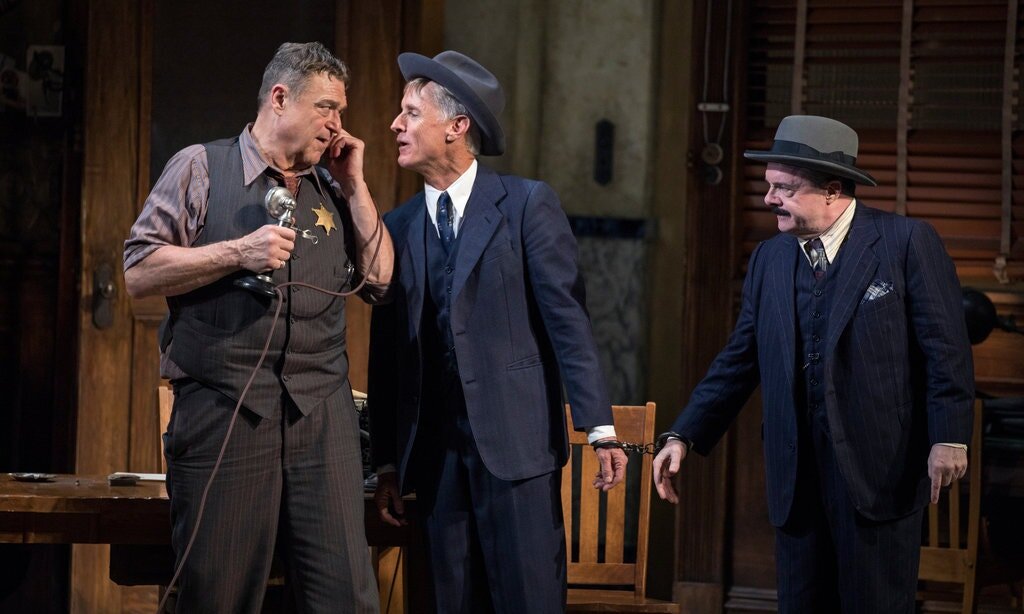The Front Page
Originally published in Paste Magazine
View this story online
“Anything doing?” asks a reporter placing a call to a police station in The Front Page. Watching this riotous revival of this disorderly comedy, back on Broadway in a star-studded production, the answer is most definitely yes. And what’s doing is unapologetic sexism, with an audience happily laughing at it.
One doesn’t go to see The Front Page expecting a politically correct, culturally sensitive evening at the theater. Written by former newspapermen Ben Hecht and Charles MacArthur, this unapologetically vulgar comedy was first produced in 1928, and its age is showing. Directed by Jack O’Brien, the star-studded cast is all white, mostly men and incredibly misogynistic.
O’Brien’s revival is not trying to hide its age. Douglas W. Schmidt’s set is adorned with signs warning of “whooping cough,” “scarlet fever” and “diphtheria” alongside posters of scantily clad pin-up girls. Period-perfect telephones ring, and the one mechanical device used for writing is a typewriter, which a man frantically writes upon using only his index fingers. Politics are discussed bluntly and in person, with talk of “smashing the Red Menace” and “Bolshevik radicals.”
Viewed in such a setting, one might think the attitude towards women might be made more digestible. And, for many members of the audience, who were laughing almost nonstop throughout the performance, it apparently is. But when viewed within the context of the action offstage and in real life, some moments are more horrifying than hilarious.
Onstage, the action is driven by men in a world where women are merely accessories. A group of reporters are found working the night shift while waiting to report on the hanging of Earl Williams, a man accused of being a Bolshevik radical. Having been pardoned twice already, his execution has escalated into a political device for the city’s sheriff and mayor, who are running for re-election on a “law and order ticket.” For the city’s numerous and varied newspapers (again, a nod to the distant past), the front pages are waiting to be written.
The group of reporters is a large one, and they are brought to life in delightfully developed performances by a star-studded ensemble cast, including Jefferson Mays as a hilarious hypochondriac, Dylan Baker as a plain-spoken journalist, John Goodman as a corrupt sheriff, Robert Morse as a good-natured every man and an especially entertaining Micah Stock as a policeman. Out of the 20+ men in the cast, there are only four women: Molly Malloy (Sherie Rene Scott, a friend of the accused), the plain-spoken cleaning lady (Patricia Connolly), the besotted fiancé Peggy (Halley Feiffer) and her imperious and unflappable mother (Holland Taylor).
But while women are not often seen, they are quite frequently the topic of discussion by the men. When Molly dares to voice a dissenting opinion, she is called a “nervy bitch.” In between filing stories, men discuss what they would “do with a pure girl.” An editor lists off a collection of alleged murderesses and asks, “What do you think women are?” When a reporter calls a woman to inquire of the “Peeping Tom” bothering her, he then inquires of her having played Lady Godiva in a performance seven years before. It’s unapologetic slut-shaming disguised as reporting, and it’s all too relevant of the manner in which women are treated modern-day culture, almost 100 years after the play was written.
One of these men, Hildy Johnson, is about to bid farewell to the business and escape into a life of respectability and matrimony. Played by John Slattery in an energetic performance of boyish charm, his departure is met with rage by his demanding editor Walter Burns, who is brought to life in nearly apoplectic frustration by Nathan Lane. Despite his declarations of love and desire for wedded bliss and respectability, Johnson’s march to the altar is a reluctant one due to his love of the excitement of reporting, and he sneaks in one last quick hit when Williams himself crashes through the window of the newsroom, declaring his innocence and seeking a hiding place. Hildy is forced to choose between his love of work and his love for Peggy (whose name we almost never hear, as he only refers to her as “my girl”).
Played by Halley Feiffer in a performance of attractive earnestness, Peggy is an underdeveloped character, written as little more than a collection of stereotypes: a sweet, kind, good and very young girl who wants to get married and start a family. She’s even bringing her mother along for the ride. But why Peggy wants to do that with Johnson, whom she says abandoned her on New Year’s Eve and her birthday, among other dates, is difficult to understand. He seems to view her a little more than a distraction from his job, and the majority of their conversations consist of him pleading with her to stop crying so he can get back to work. When they do talk, she speaks to him more like a child than a partner. It’s clear she has no place in the testosterone-driven world of newspaper reporting, where stenographers are objectified and a man yells into the phone, “Listen here, you damn slut” and then asks in righteous indignation to her response, “What kind of language is that?”
The dated aspects of The Front Page are frustrating to witness, but so was the audience’s response. While the need for escapism through entertainment is most definitely understandable, so is the conscious choice of what kind of media to consume. Along with marching in the streets, citizens can be active through literacy of media and entertainment, and, while The Front Page is an entertaining night at the theatre, one hopes the audience does not forget what is happening outside when the lights turn back on.

